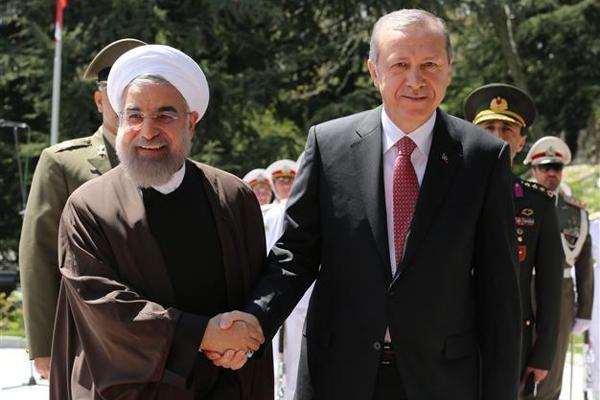Turkey, Iran ‘should act together to stop bloodshed’
TEHRAN/ANKARA


Iran's President Hassan Rouhani shakes hands with Turkish President Recep Tayyip Erdogan (R) during an official welcoming ceremony following the latter's arrival at the Saadabad Palace in Tehran on April 7, 2015, for an official one-day visit as the two countries criticized each other in recent weeks on their respective policies in the region. AFP Photo
Turkish President Recep Tayyip Erdoğan has said Turkey and Iran “should play the mediation role” in the conflicts in Iraq and Syria, while also complaining about the high price of natural gas Turkey imports from its neighbor.During a joint press conference with Iranian President Hassan Rouhani in Tehran on April 7, Erdoğan said, “History and culture has been slaughtered in Iraq,” noting that more than 100,000 people have died in Iraq and at least 300,000 people have died in Syria as well.
“I don’t look at the sect. It does not concern me whether those killed are Shiite or Sunni, what concerns me is Muslims,” Erdoğan said during his one-day visit to the neighboring country, adding that Iran and Turkey should mediate between the battling parties and hope to obtain a result.
“We have to put an end to this bloodshed, this death,” said the president.
Erdoğan and Turkey have backed a Saudi-led military campaign against Houthi insurgents in Yemen. Tehran supports the Shiite Houthis, and Erdoğan’s remarks regarding the situation in Yemen had angered some Iranian officials.
“We both believed that it is necessary for us to witness the end of war and bloodletting in Yemen as soon as possible,” Rouhani said.
About the meetings between Turkish and Iranian delegations, Rouhani said: “We agreed that there will be no tolerance for instability or distrust in the two countries’ relations.”
The two presidents signed eight agreements and emphasized the need for greater economic cooperation, with Erdoğan saying the two countries were far behind a target to lift trade volume to $30 billion a year.
Trade between the two totaled around $14 billion in 2014.
He also said Turkey and Iran should start trading in their own currencies instead of dollars or euros to avoid foreign exchange volatility, and complained about the price of natural gas imports from Iran.
“At the moment, we buy the most expensive gas from Iran,” said the president. “We do not want to be at this point. We should bring this down to a more suitable level.”
Erdoğan is being accompanied by six ministers from the cabinet of Prime Minister Ahmet Davutoğlu.
Foreign Minister Mevlüt Çavuşoğlu, Economy Minister Nihat Zeybekci, Customs and Trade Minister Nurettin Canikli, Energy Minister Taner Yıldız, Culture and Tourism Minister Ömer Çelik and Development Minister Cevdet Yılmaz are all participating in the trip.
Erdoğan hosts Saudi deputy crown prince
Erdoğan hosted Saudi Deputy Crown Prince and Interior Minister Prince Mohammad bin Nayef al-Saud at a lengthy meeting hours before departing for an official visit to Tehran.
Bin Nayef’s visit was not announced on the daily schedule of Erdoğan regularly posted on the official webpage of the presidency of the Republic of Turkey.
Accompanied by a delegation, the visiting deputy crown prince arrived in the Turkish capital at around 6 p.m. on April 6, the state-run Anadolu Agency reported. The agency noted that the delegation, which travelled to Turkey on Bin Nayef’s private plane, was welcomed by Interior Minister Sebahattin Öztürk at the airport.
Later in the evening of April 6, Anadolu briefly reported that the meeting between Erdoğan and Bin Nayef, which took place at the former’s presidential palace, lasted for an hour and 40 minutes.
The surprise meeting came just hours before Erdoğan’s scheduled visit to neighboring Iran on April 7, despite recent tensions between Ankara and Tehran over the Saudi-led bombing operation in Yemen.
